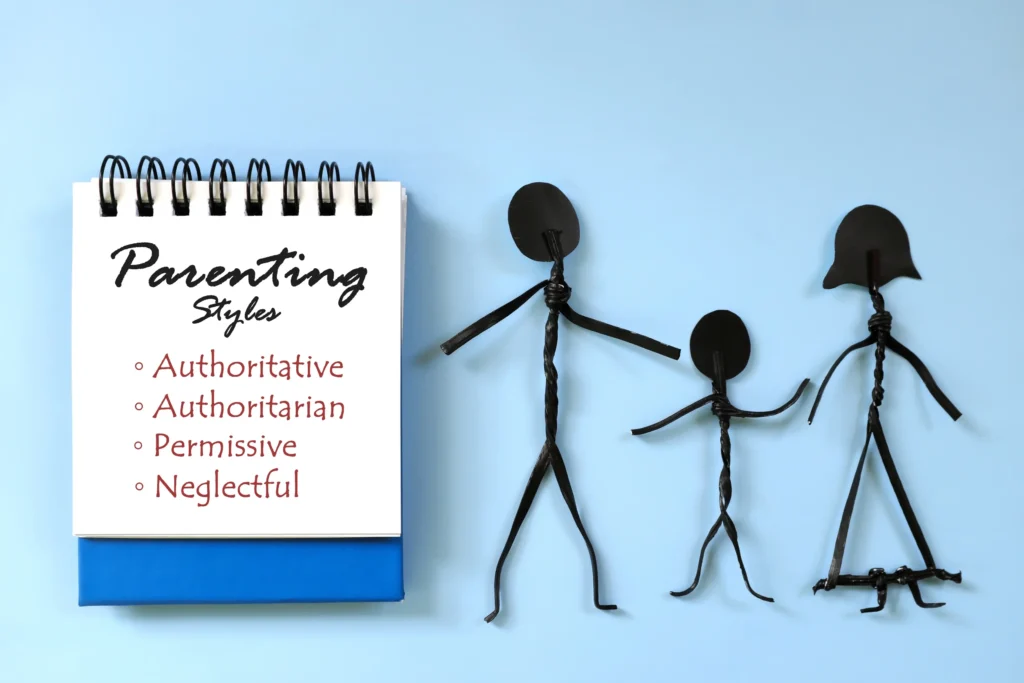We all have moments as parents when we are too tired to argue, overwhelmed, or worn out. When our children are persistent and we’re too tired to enforce limits, it’s easy to give in to their demands. What happens when the behavior becomes a habit? You may have found yourself giving in to the whims of your child and wondered if you were a “permissive” parent. Can Permissive Parents Change?
We’ll explore what permissive parenting is, the impact it may have on your child, and how to correct yourself if you find yourself drifting towards this parenting style.
What is Permissive Parenting?
Permissive parenting is a parenting style that was coined in the late 1960s by psychologist Diana Baumrind. It describes a loving and warm parenting style, but one where parents fail to establish appropriate boundaries. Baumrind defined three parenting styles: authoritative, authoritarian and permissive. Authoritarian parents can be rigid and strict, while authoritative parents mix structure and warmth. Permissive parents, on the other hand, tend to avoid rules and dislike having consequences.

Parents who are permissive tend to be those who want their children to be happy at all times, and avoid disappointment or conflict. These parents are more likely than others to give in to their children’s requests, whether it is to maintain peace or to avoid conflict.
Permissive Parenting: Two Faces
There are two subcategories in permissive parenting: neglectful and indulgent. This discussion will focus on the indulgent parenting style, which is often associated with giving in to a child’s requests. The indulgent permissive parent is often very affectionate and loving, but struggles to enforce rules or boundaries. Parents who prioritize avoiding conflicts over maintaining structure may struggle to be consistent with their parenting.
You Might Also Like: Truths About Parenting a Toddler While Pregnant
What Happens to Children When Parents Are Permissive?
Although permissive parents may feel that they are doing what is right by showing their children love and avoiding difficult feelings like disappointment, their lack of structure and consistency can have long-term negative effects on their children.
Children who grow up with permissive parents face many challenges.
- Egocentric Behavior Without clear rules children can develop a sense that they are entitled and may struggle to take into account the feelings or needs of others.
- Problems with impulse control: These children might have difficulty controlling their emotions and impulsive behaviors.
- Problems with authority and rules. When children don’t learn to follow rules consistently, they can struggle to do so in other settings, such as school or social settings.
- Emotional regulation problems: Some children have difficulty managing their emotions because they were not taught healthy ways to deal with disappointment or frustration.
- Low self-esteem: Children may not feel confident about their abilities to navigate or make decisions if they are not given boundaries and reinforced for appropriate behavior.
- Increased susceptibility for addiction. Research has shown that children with permissive parents are more likely to be addicted to gaming and screen time because they lack the self-control or structure to manage their own time.
Permissive Parenting vs. Free-Range Parenting
It is important to differentiate between permissive parenting and another parenting style, free range parenting. Both may appear similar, but their approaches are very different.
Parents who are “free-range” tend to encourage their children’s independence, freedom, and critical thinking. While they may let their children make mistakes or take risks, they still provide structure and guidance.
Permissive Parents, on the other hand, tend to underestimate the potential of their children, thinking that they may not be ready for responsibility or independence. Permissive parents tend to make decisions that minimize conflict and avoid challenging situations. This can hinder the development of their children, rather than encourage growth and independence.
You Might Also Like: Harmful Parenting Rules.

Signs of Permissive Parent
You may think that parents who are too permissive are the ones with kids who have no rules, curfews, or dress codes, and lack manners. They’re not alone, though.
Experts say that even if you believe that you are doing everything right for your teens and tweens, some of your behaviors could place you in the category of “pushovers” or permissive parents.
Many parents today have a misunderstanding of their role, says parenting expert Leonard Sax MD, PhD. He is a family physician in Chester County, PA and the author of Boys Adrift and Girls on the Edge . They often think that their role is to make sure the child gets into the best college, and protect them from disappointment. The safety net is there to protect the child in situations when it would be better for the child to experience the consequences.
You can learn five ways parents are too permissive and how to change.
1. No Routines or Limits
For many parents, life can get too hectic to follow through on their parenting plans, especially if it will take some work to get the kids on board. After a while, their family’s lack of routine can result in lazy, spoiled teens or tweens without schedules and responsibilities.
2. Avoiding Conflict
Parents who find it easier than getting into another argument to just give in to the demands of their teens or tweens are more lenient. It’s especially true of parents who were not raised strictly.
3. Making School an Excuse
Smart teens will use schoolwork to avoid their duties at home, as parents tend to be tolerant of anything that is deemed academic.
4. How to be a Friend to Your Teenager
Some parents who are too permissive care more about their teens liking them than they do being effective authorities.
Sax says that a friend cannot tell a friend, “You are not allowed to do that,” but a parent can. “Some ‘cool moms’ don’t believe they have the authority to exercise.”
Sax says teens need parents who are authoritative to guide them in making the right decisions, and not just friends to gossip around with. You need to be ready to make a change in your relationship with your teenager.
5. Rewarding Children with Technology
Many parents give in to their tweens’ demands for smartphones, as they are unable to resist. Giving in to your child’s demands is not good for them, even if they can call you at any time if they need a ride.
Is It Too Late to Change?
It’s not too late to change parenting styles. You can make changes now if you have been too permissive. It’s normal to change your parenting methods as you go along.
You can use these strategies to bring structure, consistency, and positive discipline into the family dynamic.
1. Set Clear Boundaries
Setting clear and consistent boundaries is the first step in a move away from permissive parenting. Create a family rule book that is understood by everyone, including the child. Even when you feel like giving in, be firm and fair with your rules. As a family, instead of making exceptions in difficult situations to the rules you have set up, try to stick by them. It will teach your child that rules are important, and must be followed.
2. Create a Routine
Routines give children structure and security and help them know what to expect during the day. A consistent routine makes it easier to enforce limits and provides the structure your child needs. Children feel more confident and secure when they know what’s expected of them. A clear structure is important for encouraging positive behavior. It can be a routine for bedtime, a morning ritual, or a schedule of chores.

3. How to Stay Focused During Tough Times
It can be hard to resist giving in when your child displays challenging behavior. This is especially true if you are trying to avoid a confrontation or tantrum. It’s important to stay calm and consistent. Remind your child to behave in a way that you expect. Tell them that if they’re too upset to hear, you will discuss the behavior later when they can talk calmly. Follow up by discussing what happened and how you could both handle it differently next time.
4. Seek Support
Seeking support when you are struggling to change can be extremely helpful. It can be helpful to speak to a parenting expert or counselor about your challenges. Understanding the reasons you may tend to fall into permissive parenting, and addressing any underlying issues, can help you be more intentional.
The University of Sydney provides parents of children between the ages of two and sixteen with a free program called Parent Works that offers evidence-based parenting advice. This is a great resource for parents who want to improve their parenting skills and create a structured, positive environment at home.
Conclusion
It’s never too late to change your parenting style. Set clear boundaries, establish routines, stay consistent, and seek support to create a structured and supportive environment. It’s okay to make adjustments along the way. Parenting is a process. You must be committed to helping your kid become a self-reliant, well-rounded individual. You can begin working on this today.



